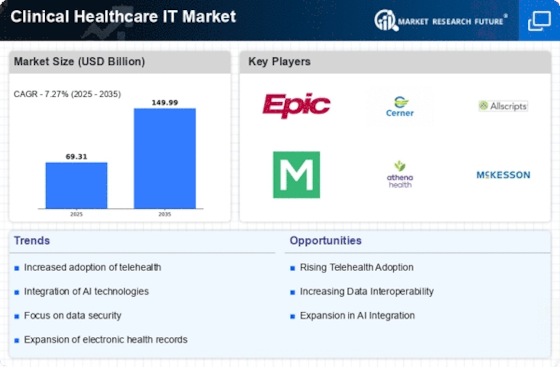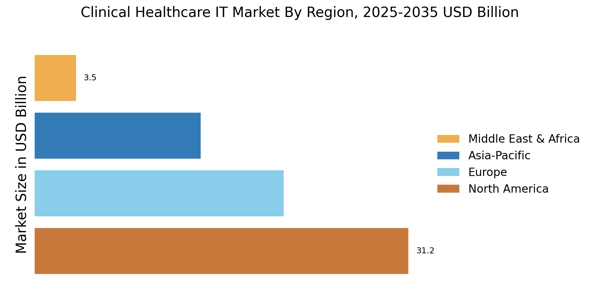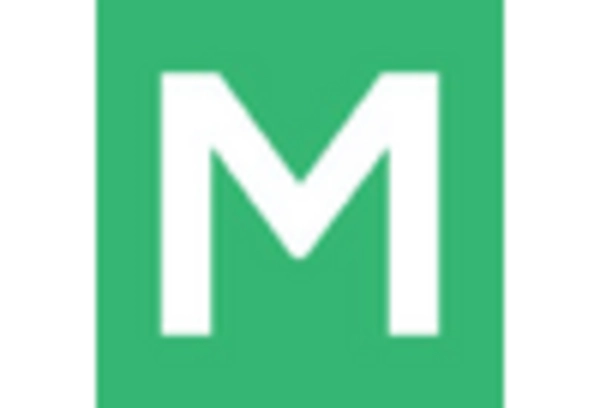Advancements in Health Data Analytics
The Clinical Healthcare IT Market is witnessing significant advancements in health data analytics, which are transforming the way healthcare organizations operate. The ability to analyze vast amounts of health data allows providers to identify trends, improve patient outcomes, and optimize resource allocation. The market for health analytics is expected to grow substantially, with projections indicating a potential increase to over 50 billion dollars by 2027. This growth is fueled by the increasing availability of data from various sources, including EHRs, wearables, and genomic data. As healthcare organizations invest in analytics solutions, they can derive actionable insights that enhance clinical decision-making and operational efficiency. Furthermore, the integration of predictive analytics is likely to play a crucial role in anticipating patient needs and improving preventive care strategies, thereby solidifying its position as a key driver in the Clinical Healthcare IT Market.
Regulatory Compliance and Data Security
Regulatory compliance and data security are paramount concerns within the Clinical Healthcare IT Market. As healthcare organizations navigate a complex landscape of regulations, the need for robust IT solutions that ensure compliance with standards such as HIPAA and GDPR becomes increasingly critical. The market for compliance management solutions is projected to grow, driven by the rising awareness of data breaches and the need for secure patient information management. Healthcare providers are investing in advanced cybersecurity measures and compliance software to protect sensitive data and maintain patient trust. This focus on regulatory adherence not only mitigates risks but also enhances the overall integrity of healthcare systems. As regulations evolve, the demand for innovative IT solutions that address compliance challenges is likely to remain a significant driver in the Clinical Healthcare IT Market.
Integration of Cloud Computing Solutions
The integration of cloud computing solutions is emerging as a transformative driver in the Clinical Healthcare IT Market. Cloud technology offers healthcare organizations the flexibility and scalability needed to manage vast amounts of data efficiently. The market for cloud-based healthcare solutions is anticipated to grow, with estimates suggesting a potential increase to over 40 billion dollars by 2025. This growth is attributed to the advantages of cloud computing, including cost-effectiveness, enhanced collaboration, and improved data accessibility. By adopting cloud solutions, healthcare providers can streamline operations, reduce IT costs, and facilitate remote access to patient information. Furthermore, the ability to leverage cloud-based analytics tools enables organizations to gain insights that drive better clinical outcomes. As the healthcare landscape continues to evolve, the integration of cloud computing is likely to play a pivotal role in shaping the future of the Clinical Healthcare IT Market.
Emphasis on Patient Engagement Technologies
In the Clinical Healthcare IT Market, there is a growing emphasis on patient engagement technologies. These tools are designed to empower patients by providing them with access to their health information and enabling them to participate actively in their care. The market for patient engagement solutions is projected to expand, with estimates suggesting a potential growth rate of over 20% annually. This trend reflects a shift towards patient-centered care, where healthcare providers leverage technology to foster better communication and collaboration with patients. By utilizing mobile applications, patient portals, and telehealth services, healthcare organizations can enhance patient satisfaction and adherence to treatment plans. This focus on engagement not only improves health outcomes but also aligns with the broader goals of value-based care, making it a critical driver in the Clinical Healthcare IT Market.
Rising Demand for Electronic Health Records (EHR)
The Clinical Healthcare IT Market is experiencing a notable surge in the demand for Electronic Health Records (EHR) systems. This trend is driven by the need for improved patient care, enhanced data management, and regulatory compliance. As healthcare providers increasingly recognize the benefits of EHRs, the market is projected to grow significantly. According to recent estimates, the EHR segment is expected to reach a valuation of approximately 30 billion dollars by 2026. This growth is indicative of a broader shift towards digitization in healthcare, where EHRs play a pivotal role in streamlining operations and facilitating better communication among healthcare professionals. The integration of EHRs not only enhances patient safety but also supports data analytics, which is crucial for informed decision-making in clinical settings.

















